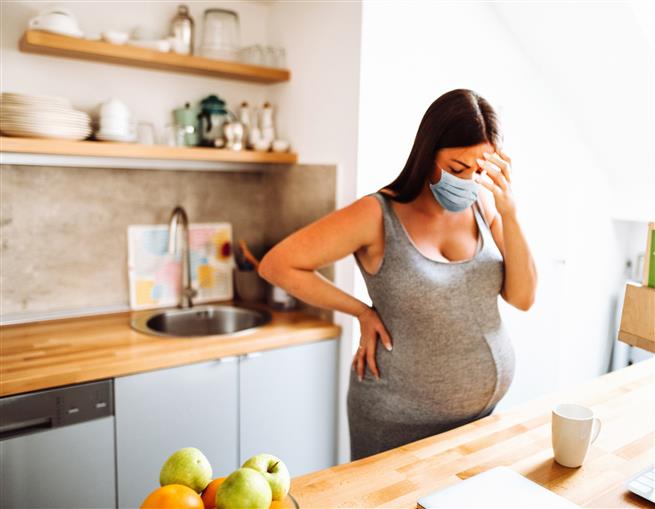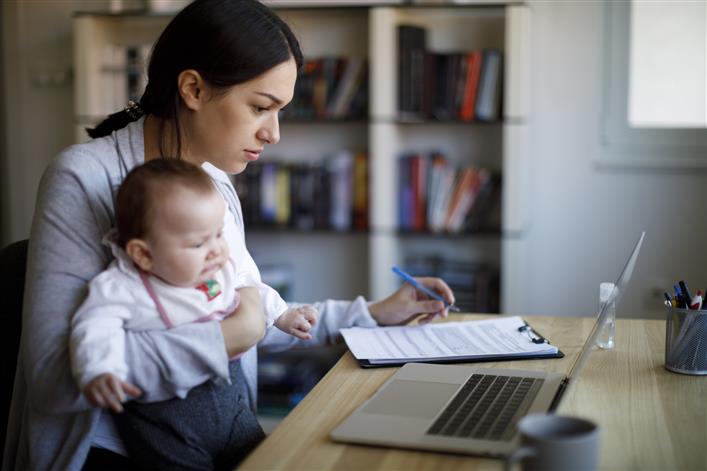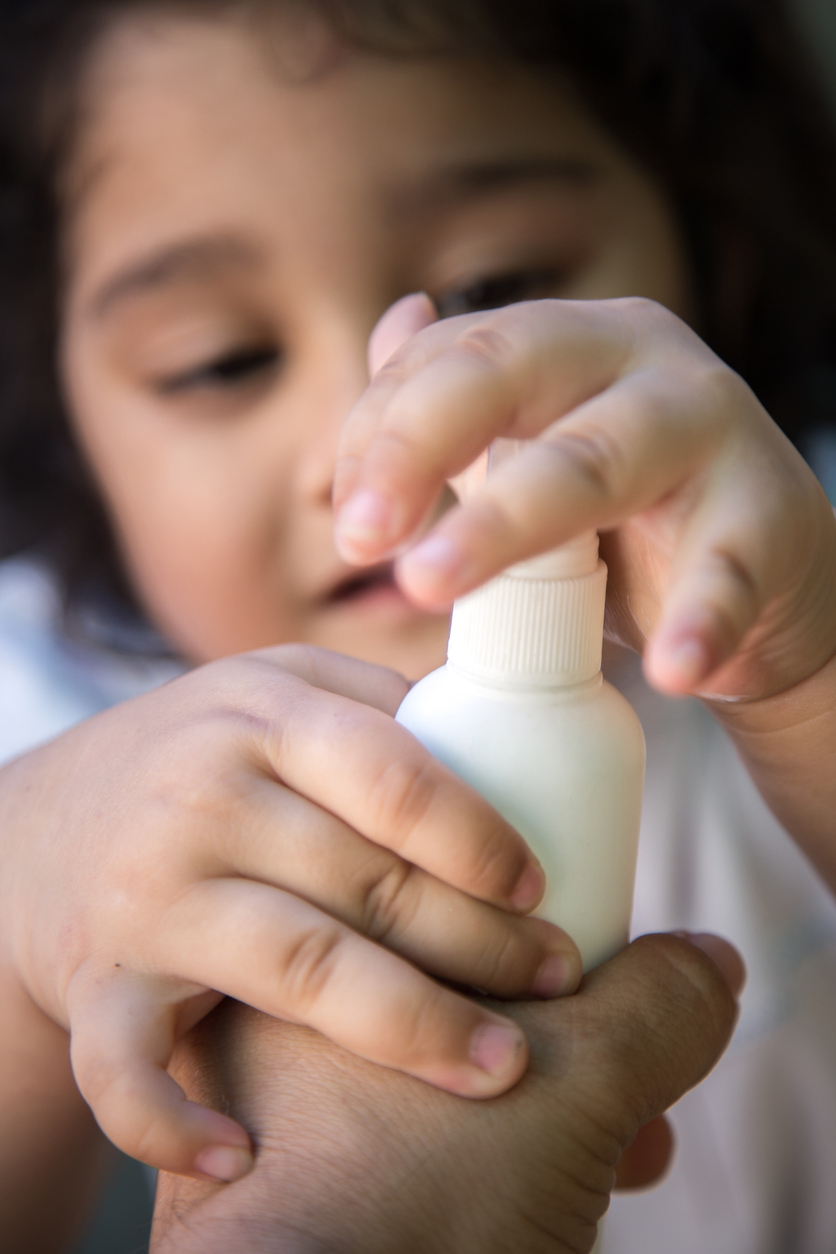Stress-sensitive moms had increased risk of delivering under-weight babies. Post-partum anxiety rose among new moms as antenatal checkups were either delayed or missed, according to a Chandigarh-based gynaecologist.
Renu Sud Sinha
Lockdown froze life, but not its creation. Not the best of times to bring a new life to a pandemic-stricken world, doomsayers would have surely advised. But for many busy couples from the frenetic era of pre-Covid times, it was an unexpected “ek-kamre-mein-band-ho” kind of stress-free freebie and they made the most of it.

Fears Doctors faced
If these were troubling times for moms-to-be and infants, for gynaecologists and other medical professionals, the pandemic was equally disturbing, perhaps more. “We were struggling with our own fears in the initial days as there were no protocols in place on how to handle patients,” says Dr Ramanpreet, senior resident on duty in Obstetrics & Gynaecology ward, Government Medical College and Hospital (GMCH), Chandigarh. “A labour room is not the place to insist on a mask to a woman screaming with pain. As a result, the aerosol content is high there. In the initial days, RT-PCR tests were not mandatory and in emergency cases waiting was not possible. We often had to counsel patients, so our fears had to take a backseat,” says Dr Swati Kashyap, another senior resident at the gynaecology ward at the GMCH.
However, if problems were aplenty, solutions were also fast and shared in speed time across India, says Dr Alka Sehgal, Head, Department of Obstetrics & Gynaecology, GMCH. “We were the first ones to come up with the idea of plastic curtains to separate patients or generally use as a protective shield,” she says. “The number of patients, too, dropped and we were able to provide quality care,” Dr Sehgal adds.
There were other pluses too. “The number of infections dropped, general health was better because of adopting stringent hygiene practices, and above all, the concept of telemedicine found a ready acceptance and is here to stay,” feels Dr Vidhu Modgil, a Ludhiana-based gynaecologist.
Extreme anxiety threw up some interesting asides, says Dr Umesh Jindal, a Chandigarh-based infertility specialist. “During the lockdown, a patient came wearing a PPE kit for a prenatal check-up.”
Pavneet (33), who delivered a baby in December last year, agrees wholeheartedly. Having a complicated obstetrics history, she says, “But for the lockdown, I would have never become a mom.” Dr Seema Sharma, a Chandigarh-based gynaecologist, obstetrician and infertility specialist, concurs on this interesting phenomenon. “Many couples, who had been undergoing treatment for infertility and/or had opted for IVF pregnancies, were able to conceive naturally.” A stress-free environment, being at the right place at the right time, an uninterrupted WFH and interrupted contraceptive supply chain resulted in a lot many pregnancies — either delayed, planned or unplanned.

Pandemic threw up new milestones for infants
In normal times, babies learn clapping or flying kisses. The first thing my baby learnt was sanitising his hands. — Sheena Guliani, a mom from Mohali.
A stress-free, secure home bubble may have helped in creating new life, but nurturing it through a virus-laden outside world was not so easy. For Agra-based school coordinator Surabhi Kaur Setia (30), a second-time mom who delivered last month, “lockdown was hell”. With a three-year-old kid, another on the way and no domestic help, it was certainly one long period of misery for Setia. On top of that, being cooped up inside often led to frequent mood swings, headaches, bouts of irritability and frustration that caused her to shout at her only support — her husband.
Ishleen(30), who had her first baby in November, says that even prenatal visits to the doctor or hospital were fraught with fear. Some were, of course, real, but some were imaginary and unknown.

Double masks with sanitiser bottles in hand for spraying anything and everything from doorknobs to car seats to chairs in the clinic waiting area to the doctor’s room were but frail armours against Covid-19. The deadly virus was lurking all around! The very air one breathed in could have been full of virus-laden aerosol and a hospital or clinical environment was, most ostensibly, the most conducive place for it to be found.
Fearful, many pregnant women delayed seeking prenatal treatment. The complete lockdown only added to the woes of moms-to-be, particularly those living in villages, small towns and tier-4 to tier-6 cities. “In absence of any public transport, many pregnant women, especially from the lower economic strata, were not able to reach the nearest government health facilities. There were no early registrations that should happen within the first three months or the first trimester,” says Dr Amanpreet Shergill, who works at the community health centre in Banur, Mohali. For those who could afford private vehicles, there was the added bureaucratic hassle of securing a medical pass from the civic authorities to move anywhere.
For Kharar-based Poonam (32), the prenatal visits only added to her already existing hypertension. “From an ultrasound scan to beds to any or all machines, I feared of everything being infected.” On return, she would have a long, hot bath, scrubbing hard and staying away from her seven-year-old first-born.
stringent hygiene norms
Rigorous self-sanitisation was limited to post-hospital visits, but the hygiene protocol in day-to-day life had increased manifold. It wasn’t just restricted to excessive cleaning of every imaginable surface in the house but now all eatables, groceries, vegetables, fruits, milk packets and what not had to be washed or wiped clean.
In the absence of domestic help, an unborn child wasn’t the only load most pregnant women had to carry. There was also the added burden of household chores, always perceived to be a woman’s job in a patriarchal society. But, thankfully, the pandemic, whether unknowingly or through necessity, was able to chip away at this archaic gendered division of work. Most husbands, and almost all men, particularly those in nuclear families rose to this ‘challenge’ that women had been handling, whether willingly or not, since centuries.
As Pavneet puts it quite succinctly and gleefully, “At least now my husband has stopped saying ‘What do you do the whole day?’”
Pregnancy is synonymous with all kinds of cravings. But the pandemic and lockdown put paid to everything. Khatta, meetha, teekha, chatpata, in short the street food, was strictly off limits, not that it was available anyways. “So, if the cravings had to be indulged in, more self-labour was needed in the kitchen,” says Ishleen. She and her husband learnt all kinds of cooking and she is particularly thankful about the last bit.
For those cautious ones like Setia, the fear of virus and exposure made them abandon the longing in favour of home-made healthy stuff.
Not everything was negative during the lockdown, as it had its silver lining. For moms-to-be, who were working professionals, lockdown meant a period of rest even if there was WFH. The absence of a frenzied rush of reaching office on time and commuting was a welcome relief. For home-makers, it was family bonding time. An additional workload, albeit shared, could not dim their shine.
However, almost all moms-to-be missed going for walks and weekend outings. The feeling of being caged only added to the hormones-induced blues.
These things, though not minor, they could cope with. The major thing most missed was the emotional support and pampering by moms, sisters, in-laws, relatives, friends, etc.
High risk, low immunity
As pregnancy is considered an immune-deficient stage, it put pregnant women at an added risk of getting infected by Covid-19, says Dr Shergill. This was the foremost fear among perhaps all women who were pregnant during the lockdown. And as is the wont of motherhood, they all feared for the safety of their unborn and not particularly for themselves.
For some, these fears came true. Ishleen, who had a Caesarean delivery, contracted Covid when her baby was just 10 days old. She wasn’t the only one, her entire family was affected. “For the next 14 days, instead of getting the care which all new mothers receive, I was managing everything on my own. Although my doctor assured me that my baby had a low risk of catching Covid from me, the quarantine period was stressful.”
For Bengaluru-based Dhruti Sanghvi, who became a mom in February last year, the entire lockdown period was quarantine only. Sanghvi, who works for Udaan, a B2B commerce startup, had to join work when her baby was just five months old. And the WFH has been no cakewalk in absence of any help. Sanghvi, who shifted with her in-laws in Ahmedabad, finds it overwhelming despite their support.
“Doing all the chores, logging in for work, feeding the baby, changing diapers all at once is really difficult. There have been times when my boss called when I was changing diapers. Another time I was bathing the baby and an emergency meeting started.” The innovative mom managed by pretending that something was wrong with the mic. Or she would remain silent and write an email later stating she missed sharing some points earlier. “There were many times when I would be on a call and the baby pooped and messed up the bed or floor.”
For infants/toddlers growing up during the pandemic, there were new milestones to be learned, as demanded by the virus. Mohali-based Sheena Guliani’s baby was seven months old when the lockdown was imposed in March-end. The initial euphoria of resting, spending time with the baby, soon gave way to depression due to loneliness and absence of any me-time, help or support in childcare and being caged inside all the time. “In normal times, babies learn clapping or flying kisses. The first thing my baby learnt was sanitising his hands,” she rues.
The age of anxiety
Mom to a three-and-a-half-year-old, for Gurugram-based Debrupa Chattopadhya, lockdown was certainly the worst of times. As layoffs flew thick and fast in the private sector, Chattopadhya and her husband were putting in extra work hours. The outcome had to be borne by their toddler. His playway-cum-daycare had shut down. The happy story-teller mom and the fun-loving dad were home but testy and glued to their laptops.
“I couldn’t sit with him for his online classes as mine and my husband’s meetings were scheduled at the same time. However, teachers expected us to be co-teachers. My child had to bear the brunt of their expectations and our busyness. My once mischievous and talkative son stopped speaking even to us. With nowhere to go and no one to turn to, he would sit silently for hours in a dark room,” says Chattopadhya. Alarmed, they tried to seek counselling but no counsellor was available in person during the lockdown. And no one would take such young kids as patients for online/video consults. It is only recently that they have started occupational therapy for him and they can see glimpses of his earlier self.
“Nuclear families were affected all over,” says Dr Mahesh Hiranandani, a Chandigarh-based neonatologist. “Screen time increased as classes moved online, parents struggling with domestic chores and increased WFH hours couldn’t provide the interactive play that peer interaction could offer. Most babies and infants learn by mirror-imaging but that was missing in absence of any social interaction. Stranger anxiety increased among infants.” The fallout, he says, would be felt in coming times. Learning dependent on social interaction would be delayed. However, he hopes these consequences would be transitory as the entire affected generation will return to normalcy in due course.
Dr Kamna Chhibber, a Delhi-based mental health specialist, says the nature of impact can’t be predicted. “The kids’ social and emotional development would be affected, as would be their language learning skill. Parents would need to adopt a proactive approach to re-integrate kids back into society.
“The lockdown has also laid bare a vital need to reorganise our support systems, for isolated families to reconnect to communities around, to talk to friends, to reach out to neighbours and older people and draw from their experience-based wisdom.”
Well, out of this chaos, if a new cosmos emerges, all this suffering would have some meaning at least.
Join Whatsapp Channel of The Tribune for latest updates.



























